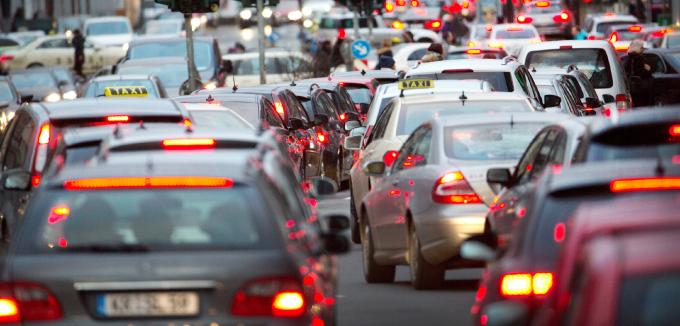DPA
Significantly less CO2 emissions by 2030: The decision of the EU environment ministers is still likely to be tough in the European Parliament
For 13 hours, the EU environment ministers are fighting for a new CO2 standard for cars by 2030. Numerous states and environmental protection organizations criticize the compromise as too lax. Angela Merkel and the German car industry would put climate protection on the wall, it is hot. Now the opponents hope for improvement in the European Parliament.
The car industry in Europe must be prepared for stricter climate protection targets. Late Tuesday night, EU countries agreed that new cars should emit an average of 35 percent less carbon dioxide in 2030 than they did in 2020.
Germany contributed the goal, although it went beyond the original wishes of the Federal Government. She only wanted 30 percent reduction. Several Member States and environmentalists criticized the compromise as not ambitious enough and hope for improvements in the now starting this Wednesday negotiations with the European Parliament.
“That was really, really difficult today,” said Environment Minister Svenja Schulze after the approximately 13-hour negotiations. EU Climate Commissioner Miguel Arias Cañete also spoke of a “difficult birth”.
Video: Germany kinks
Image: REUTERS
Ministers had spent the day negotiating how much CO2 emissions from new cars in the EU would have to decrease over the next decade. The EU Commission had proposed a reduction of 30 percent compared to 2020 – a value that the German auto industry considered feasible. This was followed by the federal government, as well as some eastern EU states.
Many other countries, however, wanted a cut of 40 percent or more. Austria, which currently holds the EU Presidency, pleaded as a compromise for 35 percent reduction and ultimately implemented it. As an interim target, at least 15 percent should be reached by 2025.
Content of many special rules not yet known
However, a number of special clauses have been agreed, such as incentives for the introduction of cars with little or no emissions in poorer EU countries, as well as special rules for niche manufacturers.
In the end, 20 of the 28 EU states voted in favor of the compromise, four states opposed it and four others abstained, as Austrian Environment Minister Elisabeth Köstinger said. “We are putting Europe’s clean mobility in the fast lane,” said Köstinger.
However, several countries had demanded more ambition on climate change and expressed deep disappointment, including Ireland, Sweden, Luxembourg and the Netherlands. The SPD MEP Ismail Ertug recalled that the European Parliament has set further goals: MEPs also want a reduction in CO2 levels by 40 percent by 2030. So there should be more difficult negotiations to ultimately complete the legislation.
Also read: Berlin must impose driving bans for diesel drivers
The specifications are intended to help achieve the overall climate goals of the European Union and reduce emissions from road traffic. The decision is very important for the auto industry.
To date, the EU has stipulated that new cars should not emit more than 95 grams of carbon dioxide per kilometer in the fleet average in 2020. From this base, the reduction should follow. Strict specifications mean that in addition to diesel and petrol, manufacturers also have to sell many vehicles without emissions in order to achieve their overall average – for example, pure electric cars. The Federal Government fears job losses if the switch to new drives is completed too quickly.
Sharp criticism of Merkel: “Climate protection on the wall” driven
At the EU summit, however, many environmental ministers argued differently – such as the representatives of Spain, the Netherlands, France and the United Kingdom. A quick conversion of the auto industry is needed in the competition with China and will create new jobs, so their argument. The Luxembourg State Secretary Claude Turmes attacked Germany head-on: Chancellor Angela Merkel drive in favor of the German carmaker “climate protection on the wall,” said the former Green MEP.
The environmental organization Greenpeace criticized the fact that the German government not only “sabotaged” the traffic revolution in Germany in Luxembourg, but also “with our European neighbors”. In view of the urgent appeal of the IPCC on Monday to limit global warming to 1.5 degrees in this century, this is “the sheer mockery”.
Germany, together with the eastern Visegrad states, prevented a more ambitious solution, complained the Transport & Environment Association. The compromise was too little to slow down the dangerous climate change.
rei / dpa / afp


